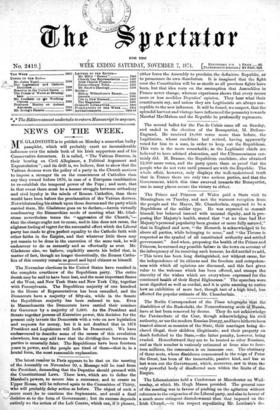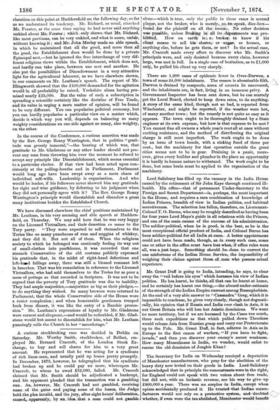The Liberationists held a Conference at Manchester on Wed- nesday,
at which Mr. Hugh Mason presided. The general tone of the meeting was in favour of pushing on the agitation Without reference to the exigencies of the Liberal party, and also in favour of a much more stringent disendowment than that imposed on the • Irish Chureb,—in this respect repudiating Mr. Leatham's de-
e]aration on this point at Huddersfield on the following day, so far as we understand its tendency. Mr. Richard, as usual, attacked Mr. Forster, at the same time saying he had never said anything unkind about Mr. Forster; which only shows-that Mr. Richard, like most partisans, can be very unkind, and what is more, unfair, without knowing it ; and Mr. John Morley made an able speech, in which he maintained that all the good, and more than the good, the Establishment does would be done by a private Episcopal sect,—but he ignored the free interchange of very dif. ferent religious views within the Establishment, which does not, and hardly can take place, between one sect and another. He also put the possibilities of Disendowment in a very attractive light for the agricultural labourer, as we have elsewhere shown, in our comments on Mr. Leatham's speech. The report of Mr. Illingworth showed that the 1100,000 demanded for the agitation would in all probability be raised, Yorkshire alone having pro- mised nearly 125,000. But the value of such a subscription in spreading a scientific certainty like the doctrine of Free Trade, and its value in urging a mere matter of opinion, will be found to be very different. You can popularise political economy, but you can hardly popularise a particular view on a matter which, decide it which way you will, depends on balancing so many weighty considerations on one side against so many, also weighty,
on the 'other. •



































 Previous page
Previous page